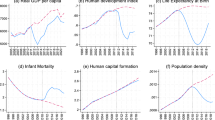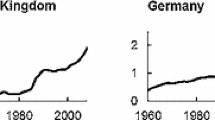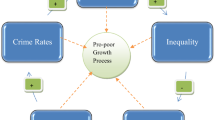Abstract
This paper evaluates the role that partisan politics plays in altering public spending levels. The analysis covers over three decades of data on the developments of the public sectors in 16 OECD countries. The results of the analysis lend firm support to the partisan politics model. Of special note is the distinction between the electorate' and the government' ideological preferences and the dominant role that the former plays. The results also suggest, contrary to conventional wisdom, that partisan political influences have not been eliminated with the tightening of linkages to the international economy.
Similar content being viewed by others
References
Alesina, A. and Rosenthal, H. (1995). Partisan politics, divided government, and the economy. Cambridge: Cambridge University Press.
Baumol, W.J. (1967).Macroeconomics of unbalanced growth: The anatomy of the urban crisis. American Economic Review 57: 415-426.
Bayourmi, T. (1990). Saving-investment correlations: Immobile capital, government policy or endogenous behavior? International Monetary Fund Staff Papers 37: 360-397.
Blais, A., Donald, D. and Dion, S. (1993). Do parties make a difference? Parties and the size of government in liberal democracies. American Journal of Political Science 37(1): 40-62.
Budge, I. (1994). A new spatial theory of party competition: Uncertainty, ideology and policy equilibria viewed comparatively and temporally. British Journal of Political Science 24: 443-467.
Budge, I., Robertson, D. and Hearl, D. (1987). Ideology, strategy and party change in 19 democracies. Cambridge: Cambridge University Press.
Cameron, D. and McDermott, K.A. (1995). The expansion and contraction of the public economy, 1960-1992. Paper presented to the Seminar on the State and Capitalism since 1800, Center for European Studies, Harvard University.
Castles, F.G. and Mair, P. (1984). Left-right political scales: Some ‘expert’ judgements. European Journal of Political Science 12: 73-88.
Comiskey, M. (1993). Electoral competition and the growth of public spending in 13 industrial democracies, 1950 to 1983. Comparative Political Studies 26(3): 350-374.
Cusack, T.R. (1988). Public expenditure decision-making: A comparative analysis. In J. Lybeck and M. Hendrekson (Eds.), Economic perspectives on the growth of government in the industrialized countries. Amsterdam: North-Holland.
Cusack, T.R. (1991). The changing contours of government. Discussion Paper of the International Relations Research Group, Wissenschaftszentrum Berlin für Sozialforschung.
Cusack, T.R. and Garrett, G. (1992). The expansion of the public economy, revisited: The politics of government spending, 1960-1988. Discussion Paper of the International Relations Research Group, Wissenschaftszentrum Berlin für Sozialforschung.
De Haan, J. and Sturm, J.-E. (1994). Political and institutional determinants of fiscal policy in the European Community. Public Choice 80: 157-172.
Garrett, A. and Lange, P. (1991). Political response to interdependence: What's ‘left’ for the left? International Organization 45(4): 539-564.
Gross, D.A. and Sigelman, L. (1984). Comparing party systems: A multidimensional approach. Comparative Politics 16: 463-479.
Hall, P. (1994). The political economies of Europe in an era of interdependence. Mimeo. Center for European Studies, Harvard University.
Helleiner, E. (1994). States and the reemergence of global finance: From Bretton Woods to the 1990s. Ithaca: Cornell University Press.
Hibbs, D.A. Jr. (1987a). The political economy of industrial democracy. Cambridge: Harvard University Press.
Hibbs, D.A. Jr. (1987b). The American political economy. Cambridge: Harvard University Press.
International Monetary Fund. (1991). Determinants and systemic consequences of international capital flows. Washington DC: IMF, Occasional Paper, No. 77.
Jackman, R.W. (1986). Elections and the democratic class struggle. World Politics 32(1): 123-146.
Keech, W.R. (1995). Economic politics: The costs of democracy. Cambridge: Cambridge University Press.
Klingemann, A.-B., Hofferbert, R. and Budge, I. (1994). Parties, policy, and democracy. Boulder: Westview Press.
Kmenta, J. (1986). Elements of econometrics. 2nd edition. New York: Macmillan.
Kurzer, P. (1993). Business and banking. Ithaca: Cornell University Press.
Levi, M. (1988). Of rule and revenue. Berkeley: University of California Press.
Lewis-Beck, M.S. and Rice, T.W. (1985). Government growth in the United States. Journal of Politics 47: 2-30.
Lybeck, J.A. and Henrekson, M. (Eds.). (1988). Explaining the growth of government. Amsterdam: North-Holland.
McCarty, T.A. (1993). Demographic diversity and the size of the public sector. Kyklos 46(2): 225-240.
Mueller, D.C. and Murrell, P. (1986). Interest groups and the size of government. Public Choice 48: 125-145.
Olson, M. (1982). The rise and decline of nations. New Haven: Yale University Press.
Rose, R. (1984). Do parties make a difference? 2nd edition. London: Macmillan.
Roubini, N. and Sachs, J.D. (1989a). Political and economic determinants of budget deficits in the industrial democracies. European Economic Review 33: 903-938.
Roubini, N. and Sachs, J.D. (1989b). Government spending and budget deficits in the industrial democracies. Economic Policy 8: 100-132.
Ruggie, J.G. (1982). International regimes, transactions, and change: Embedded liberalism in the postwar economic order. International Organization 36(2): 379-414.
Russett, B.M. (1970). What price vigilance? The burdens of national defense. New Haven: Yale University Press.
Scharpf, F.W. (1987). Crisis and choice in European social democracy. Ithaca: Cornell University Press.
Simmonds, B. (1995). International financial integration. Paper presented at the conference on Globalization and Varieties of Capitalism. Berlin: Humboldt University.
Streeck, W. and Schmitter, P. (1991). From national corporatism to transnational pluralism. Politics & Society 19: 133-164.
Taylor, C.L. and Hudson, M.C. (1972). World handbook of political and social indicators. 2nd edition. New Haven: Yale University Press.
Volkens, A. (1994). Sozio-Ökonomisch Polarisierung zwischen Parteien, Regierung und Opposition und Regierungswechsel in den OECD-Staaten 1945 bis 1990. Ph.D. Dissertation, Free University of Berlin.
von Beyme, K. (1985). Political parties in western democracies. Aldershot: Gower.
Wilensky, H.L. (1975). The welfare state and equality. Berkeley: University of California Press.
Wittman, D. (1973). Parties as utility maximizers. American Political Science Review 67: 490-498.
Wittman, D. (1983). Candidate motivations: A synthesis of alternative theories. American Political Science Review 77: 142-157.
Author information
Authors and Affiliations
Rights and permissions
About this article
Cite this article
Cusack, T.R. Partisan politics and public finance: Changes in public spending in the industrialized democracies, 1955–1989. Public Choice 91, 375–395 (1997). https://doi.org/10.1023/A:1004995814758
Issue Date:
DOI: https://doi.org/10.1023/A:1004995814758




